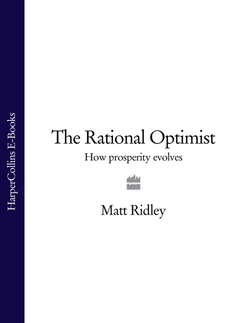The Rational Optimist: How Prosperity Evolves

Реклама. ООО «ЛитРес», ИНН: 7719571260.
Оглавление
Matt Ridley. The Rational Optimist: How Prosperity Evolves
The Rational Optimist. How Prosperity Evolves. Matt Ridley
Table of Contents
PROLOGUE When ideas have sex
Mating minds
CHAPTER 1 A better today: the unprecedented present
Affluence for all
Cheap light
Saving time
Happiness
Crunch
The declaration of interdependence
The multiplication of labour
Self-sufficiency is poverty
Arcadia redux
The call of the new
CHAPTER 2 The collective brain: exchange and specialisation after 200,000 years ago
Homo dynamicus
Starting to barter
Hunting for gathering
Beachcombing east
Shall we trade?
Ricardo’s magic trick
Innovation networks
Networking in the near-east
CHAPTER 3 The manufacture of virtue: barter, trust and rules after 50,000 years ago
Finding a trade buddy
The trust juice
The shadow of the future
If trust makes markets work, can markets generate trust?
Coercion is the opposite of freedom
The corporate monster
Commerce and creativity
Rules and tools
CHAPTER 4 The feeding of the nine billion: farming after 10,000 years ago
No farming without trade
Capital and metal
Ignoble savage?
The fertiliser revolution
Borlaug’s genes
Intensive farming saves nature
Organic’s wrong call
The many ways of modifying genes
CHAPTER 5 The triumph of cities: trade after 5,000 years ago
The ur-city
Cotton and fish
The flag follows trade
The maritime revolution
The virtue of fragmented government
From Ganges to Tiber
Ships of the desert
The merchant of Pisa
The Moloch state
Repeal the corn laws again
The apotheosis of the city
CHAPTER 6 Escaping Malthus’s trap: population after 1200
The medieval collapse
The industrious revolution
British exceptionalism
The demographic transition
An unexplained phenomenon
CHAPTER 7 The release of slaves: energy after 1700
Wealthier yet and wealthier
The metal Midlands
Demand it and they will supply
King coal
Dynamo
Heat is work and work is heat
The mad world of biofuels
Efficiency and demand
CHAPTER 8 The invention of invention: increasing returns after 1800
Innovation is like a bush fire
Driven by science?
Capital?
Intellectual property?
Government?
Exchange!
Infinite possibility
CHAPTER 9 Turning points: pessimism after 1900
A brief history of bad news
Turning-point-itis
Worse and worse
Cancer
Nuclear Armageddon
Famine
Resources
Clean air
Genes
Plague
Sounding the retreat
CHAPTER 10 The two great pessimisms of today: Africa and climate after 2010
Africa’s bottom billion
Aid’s test
Bound to fail?
The world is your oyster
Climate
Warmer and richer or cooler and poorer?
Saving ecosystems
Decarbonising the economy
CHAPTER 11 The catallaxy: rational optimism about 2100
Onward and upward
How good could it get?
NOTES AND REFERENCES
Prologue
Chapter 1
Chapter 2
Chapter 3
Chapter 4
Chapter 5
INDEX
Acknowledgements
By the same author
Copyright
About the Publisher
Отрывок из книги
For Matthew and Iris
ADAM SMITH
.....
But there is nothing unnatural about this. In fact, it is a very typical human pattern. By the age of 15 chimpanzees have produced about 40 per cent and consumed about 40 per cent of the calories they will need during their entire lives. By the same age, human hunter-gatherers have consumed about 20 per cent of their lifetime calories, but produced just 4 per cent. More than any other animal, human beings borrow against their future capabilities by depending on others in their early years. A big reason for this is that hunter-gatherers have always specialised in foods that need extraction and processing – roots that need to be dug and cooked, clams that need to be opened, nuts that need to be cracked, carcasses that need to be butchered – whereas chimpanzees eat things that simply need to be found and gathered, like fruit or termites. Learning to do this extraction and processing takes time, practice and a big brain, but once a human being has learnt, he or she can produce a huge surplus of calories to share with the children. Intriguingly, this pattern of production over the lifespan in hunter-gatherers is more like the modern Western lifestyle than it is like the farming, feudal or early industrial lifestyles. That is to say, the notion of children taking twenty years even to start to bring in more than they consume, and then having forty years of very high productivity, is common to hunter-gatherers and modern societies, but was less true in the period in between, when children could and did go to work to support their own consumption.
The difference today is that intergenerational transfers take a more collective form – income tax on all productive people in their prime pays for education for all, for example. In that sense, the economy (like a chain letter, but unlike a shark, actually) must keep moving forward or it collapses. The banking system makes it possible for people to borrow and consume when they are young and to save and lend when they are old, smoothing their family living standards over the decades. Posterity can pay for its ancestors’ lives because posterity can be richer through innovation. If somebody somewhere takes out a mortgage, which he will repay in three decades’ time, to invest in a business that invents a gadget that saves his customers time, then that money, brought forward from the future, will enrich both him and those customers to the point where the loan can be repaid to posterity. That is growth. If, on the other hand, somebody takes out a loan just to support his luxury lifestyle, or to speculate on asset markets by buying a second home, then posterity will be the loser. That is what, it is now clear, far too many people and businesses did in the 2000s – they borrowed more from posterity than their innovation rate would support. They misallocated the resources to unproductive ends. Most past bursts of human prosperity have come to naught because they allocated too little money to innovation and too much to asset price inflation or to war, corruption, luxury and theft.
.....